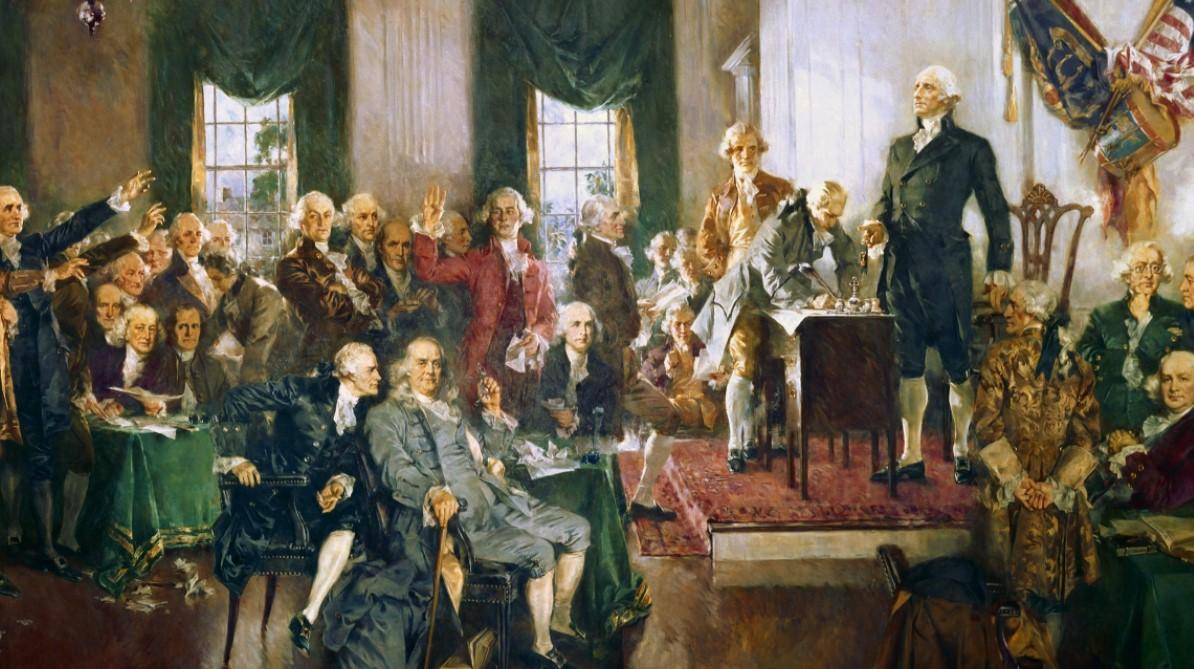
The Debate over the Scope of National Power
[Chapter 15 of Rothbard’s newly edited and released Conceived in Liberty, vol. 5, The New Republic: 1784–1791.]
At the end of May [of 1787], the convention approved with little debate the severely national power granted to Congress, including the absolute power to act when it deemed the states to be “incompetent” and to veto all state laws it held to violate the constitution or any national treaties (a device added by Benjamin Franklin). Charles Pinckney, John Rutledge, and Pierce Butler of South Carolina expressed worry over the sweeping nature of congressional power; Randolph rather ingeniously denied any intention to destroy state power, while Madison held that broad national consolidation would override any contrary wishes for a limited enumeration of power. For his part, James Wilson asserted brusquely “that it would be impossible to enumerate the powers which the federal Legislature ought to have”; its power must, in short, be boundless. Finally, the convention granted Congress the absolute power to act whenever states were not competent by a vote of 9-0-1; only Connecticut failed to agree due to the actions of Roger Sherman. Madison did opportunistically prefer an amendment of the clause authorizing force against the states because force, Madison correctly observed, “would look more like a declaration of war, than an infliction of punishment.”
Extended discussion did arise, however, over the nature of executive power. What specific form should it take? Should it, for example, be single or plural? Predictably, the ultra-nationalists, led by James Wilson, Charles Pinckney, and John Rutledge, urged a single executive (which would concentrate the most power and be closest to an American monarchy). Roger Sherman urgently insisted, in opposition, that the executive was only an instrument for carrying out the will of the legislature and, therefore, the members of the executive should be left to the discretion of Congress. Edmund Randolph passionately warned that a single executive would be “a foetus of monarchy.” He suggested instead a plural three-way executive. Randolph insisted that he would be opposed to a single executive as long as he lived. The “permanent temper of the people,” Randolph warned, “was adverse to the very semblance of Monarchy.” To this, Wilson and the other ultra-nationalists hastened to assure the convention that there was no resemblance whatever to the British monarchy.
Wilson’s use of dramatic rhetoric toward the necessity of concentrated power was advanced even further by South Carolina’s Pierce Butler, who declared that a single executive would in some way “be responsible to the whole, and would be impartial to its interests.” Butler was particularly concerned to have a single “impartial” executive for conducting military actions. For his part, James Wilson seems to have deplored the use of the alleged devotion of the Founding Fathers at Philadelphia to “checks and balances” in government; instead, a plural executive was rejected by him because it allowed for more disagreement, which would have prevented the effective and unchecked actions of the national government. On June 4 the convention fatefully acceded to Wilson’s desire for a single executive. The vote was 7-3, New York, Maryland, and Delaware objecting. Virginia’s delegation was split 4-3 in favor of Wilson’s scheme over its own; George Mason, Edmund Randolph and John Blair were overruled by nationalists James Madison, George Wythe, and James McClurg, joined by a rare George Washington tie-breaking vote.
James Wilson, on June 1 and 2, continued to promote his emphatically ingenious scheme for the reality of tyranny unopposed in a plebiscitary-democratic form. Wilson, in short, called for replacing the Virginia Plan’s selection of the executive by Congress. Instead, the executive would be chosen directly by the people, voting in state districts to choose electors, who in turn would select the executive. Thus, in the name of popular election, the executive would be removed from its natural dependence in the body making the laws (the legislature) and exist independently and remotely in its own power base, ostensibly subordinate to the broad public, but in reality removed from effective public control. The insulation from public control was further ensured by the device of the Electoral College, which placed the executive far removed from popular choice. Wilson also repeated his argument for a popular election of the lower house, since only with this would the people truly be inclined to place their confidence in their national rulers.
Roger Sherman, as in so many other issues, cogently opposed the ultra-nationalist schemes. Sherman “was for the appointment by the Legislature and for making him absolutely dependent on that body, as it was the will of that which was to be executed. An independence of the Executive on the supreme Legislative, was in his opinion the very essence of tyranny if there was any such thing.” Finally, Wilson’s proposal was beaten down by 8-2, with only Maryland and Pennsylvania in favor. The convention promptly agreed that Congress would elect the single executive for a term of seven years; again the vote was 8-2, with Pennsylvania and Maryland voting no. The lengthy seven-year term, however, was a victory for the nationalists. It was proposed by Charles Pinckney and attacked by Gunning Bedford of Delaware, who called for a three-year term. The seven-year clause was passed by the close vote of 5-4-1 (Yes: New York, New Jersey, Pennsylvania, Delaware, Virginia; No: North Carolina, South Carolina, Georgia, Connecticut; Divided: Massachusetts). The nationalists won another handful by overwhelmingly crushing an intelligent proposal by John Dickinson, a veteran conservative worried by excessively nationalist trends, that the executive be removable by Congress with a majority of the state legislatures.
On June 4 the question of the preferred veto power for a Council of Revision ran into the sensible theory that judges should not be part of a vetoing council because they were also the arbiter of the constitutionality of laws. There was also a remarkable clause pushed by the ultra-nationalists James Wilson and Alexander Hamilton to give the executive an absolute veto power over Congress, a vast power that they somehow contended would not be “too much exercised.” Its very existence would “preserve harmony and prevent mischief,” i.e., it would ensure the subservience of Congress to the supreme will of the executive. Even so strong a nationalist as Pierce Butler balked at this, warning of another Oliver Cromwell, and James Madison felt that the people were not yet ready “to give such a prerogative.”
To meet this new threat by the ultras, George Mason rose to the height of his eloquence and thundered that the executive would be a monarchy even more dangerous than the British because it was elected. Mason “hoped that nothing like a monarchy would ever be attempted in this Country. A hatred to its oppressions had carried the people through the late Revolution.” The Wilson-Hamilton proposal for absolute veto was defeated unanimously by the states. The single executive, however, was given veto power that could only be overridden by two-thirds of each house of Congress, and the veto was vested in him alone and not in a Council of Revision. The requirements for overriding the veto were so stringent that an elective monarchy in the United States may be said to have been imposed in any case.
Who would appoint the judiciary? The Virginia Plan’s appointment of the Supreme Court by Congress was fought by Wilson, who urged that the executive, “a single, responsible person,” be given the power to appoint the entire judiciary; again, all power would be concentrated in the president. But this time John Rutledge balked at the specter of monarchy, and Sherman and Pinckney urged the original Virginia Plan. James Madison, however, proposed and carried a compromise for selection of the Supreme Court by the Senate.
A particularly severe struggle occurred over the role of the inferior courts. The moderates, led by Rutledge and Sherman, wanted no inferior courts whatever, all original cases could be heard in the state courts, and the federal Supreme Court would then be limited to an appellate role, which would be sufficient to ensure national uniformity. Any structure of federal inferior courts would pose a severe threat to state power and raise the potential for a national dictator. Madison, for several reasons, led the nationalist fight for a body of inferior courts with full jurisdiction in many cases, thus would the federal judiciary be “commensurate to the legislative authority.”
Rutledge’s proposal to eliminate the clause establishing federal inferior courts passed, on June 5, by a narrow vote of 5-4-2 (Yes: Connecticut, New Jersey, North Carolina, South Carolina, Georgia; No: Pennsylvania, Delaware, Maryland, Virginia; Divided: Massachusetts, New York). But just when it seemed that the Right had suffered a significant loss, the nationalists bounced back to capture once more, as in the case of the executive veto power, the essence of their goals at the expense of a slight loss of the form. Wilson and Madison ensured that Congress “be empowered” (though not compelled) to establish inferior courts and won by a vote of 8-2-1, Connecticut and South Carolina being opposed and New York divided. Again the nationalists won the essence of their demands.
At this early date in the convention, the nationalists began to hint of their essentially revolutionary design to not submit the new Constitution as a legal amendment to the Articles. Roger Sherman objected to the Virginia Plan idea of submitting their decisions to state conventions with the consent of Congress; why not ratify them in the state legislatures? Madison fell back on the Wilsonian pseudo-democratic rhetoric, while Rufus King let slip the real reason for the sudden accession of democratic form by the nationalists: “A Convention being a single house, the adoption may more easily be carried thro’ it, than thro’ the Legislatures where there are several branches. The Legislatures also being to lose power, will be most likely to raise objections.” In other words, there was no chance of ratification in the state legislatures, and the electors chosen by state conventions could be more easily “persuaded.” After the convention was softened up with this skirting with illegality, James Wilson offered a truly subversive direction: why allow the bulk of the states to be blocked by the “inconsiderate or selfish opposition of a few [States]”? Why not just choose ratification after only a certain number of states—Pinckney helpfully supporting nine? The issue was postponed by the possibly stunned assemblage, with no comment made on this blunt proposal to scrap the unanimity proposal of the existing Confederation.
Thus, by June 7, the nationalists, though forced to make a few concessions, had so far carried the substance of their program: the creation of a supreme national government and a Congress empowered to act whenever it thought the states were incompetent to veto any state laws it felt threatened the Constitution or national treaties, though it was not empowered to coerce the states; an independent and powerful single executive chosen by Congress for seven years with a nearly absolute veto power over Congress; a national supreme judiciary appointed by the Senate and a system of inferior courts established by Congress and appointed by the president, the judges all to be appointed for life terms; a bicameral Congress, with the lower house elected by the people; and the Constitution would be submitted to state conventions rather than legislatures, and potentially secured through a union of nine states rather than by unanimous ratification. The election of senators in the upper house by state legislatures was the only substantial setback so far for the nationalist cause.
On June 8 the exultant nationalists moved to further augment the central power even more; Congress had already been given the absolute power of vetoing state laws deemed to be unconstitutional or in violation of national treaties. Now the emboldened nationalists moved to crush the states altogether, as Charles Pinckney proposed that Congress have the absolute power to veto all state laws whatsoever. James Madison seconded with an impassioned plea for such total power as “absolutely necessary to a perfect system”; in fact, the absolute veto was the least that could be done. James Wilson’s frenzy was, predictably, even greater, as he thundered that “We are now one nation of brethren. We must bury all local interests & distinctions.”
The opposition to all this fire-eating was weak; once again, the liberals and moderates were stymied by their agreement with the fundamental tendency and direction of the nationalists, though not with the length to which the ultra-nationalists pushed the logic of their views. Only Gunning Bedford delivered an opposition of any force or spirit. Bedford spoke up for the several states in danger of being crushed by the advancing juggernaut of Pennsylvania and Virginia, who “wished to provide a system in which they would have an enormous & monstrous influence.” Yet the Pinckney proposal for a universal congressional veto over the states was defeated by the tremendous margin of 7-3-1. Voting for the nationalist dream, indeed, were precisely the three big states: Massachusetts, Pennsylvania, and Virginia. Virginia’s delegation was again split, Mason and Randolph objecting, while McClurg and Blair followed Madison’s lead. Delaware was the divided state, and the conservatives Read and Dickinson were blocked by Bedford and Richard Bassett.1
[The numbering of the footnotes in this article differs from that in the original book. Please consult the book for all notes.]
- 1. Max Farrand, The Records of the Federal Convention of 1787, vol. 1 (New Haven, CT: Yale University Press, 1911), pp. 54–68, 88, 98–102, 119–23, 164–67.



